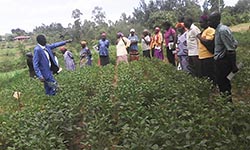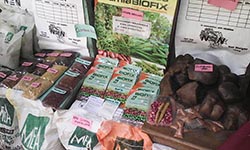The One Stop Shop Operations Mechanism (OSSOM) was started in Kenya at the beginning of 2017 to better link “last mile” agrodealers to commercial manufacturers and distributors of BNF technologies. This move followed three year’s reliance upon the Western Region Agricultural Technology Evaluation (WeRATE) as N2Africa’s main outreach partner in west Kenya, an umbrella organization comprising 28 farmer associations. We realized that WeRATE was effective at conducting BNF technology tests and organizing farmer field days around them, but did not have the agribusiness orientation necessary to form lasting commercial linkages. OSSOM was formed from 15 WeRATE members that agreed to establish One Stop Shops as registered, year-round business entities dedicated to trade in legume technologies. Many of these businesses also deal in grain legumes and value addition. This shift in focus was doable because all of the necessary ingredients to modern legume production (improved seed, specially-blended fertilizers and rhizobial inoculants) were fully commercialized in Kenya. Furthermore, input distributors were actively seeking local stockists to retail their products, and so too were buyers and processors of grain legumes looking for reliable suppliers.

|

|
Nevertheless, new perspectives were needed to ensure OSSOM’s future. Locally-devised product demonstrations replaced formal technology tests. Customer Open Houses replaced grassroots farmer field days. Sales logs and test marketing replaced household surveys. Some emerging retail operations were very conservative, marketing only those technologies provided through OSSOM contacts to their grassroots group members, but others seized their new business opportunities to diversify into fully operational agricultural suppliers offering a full range of seed, fertilizer, farming consultancy and pest control products. One early setback appeared when the Kenya Plant Health Inspection Service (KEPHIS) cited some One Stop Shops for not being certified agrodealers, but then KEPHIS and OSSOM worked with these same operators to become duly registered. Other product and service providers became attracted to OSSOM including extension agencies and credit facilities. Most recently, the Soybean Farm to Market Alliance, initiated by the World Food Program, is consolidating its activities around OSSOM members as it begins operations in six counties in west Kenya. Given this commercial and developmental momentum, we foresee OSSOM as an innovative product and service provider continuing into the future and for this reason it features so prominently into Kenya’s N2Africa exit strategy.
Welissa Mulei and Josephine Ongoma, OSSOM Managers
